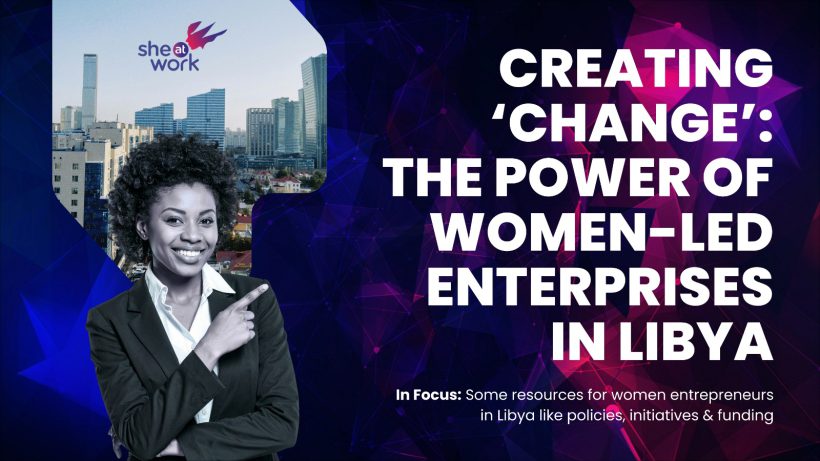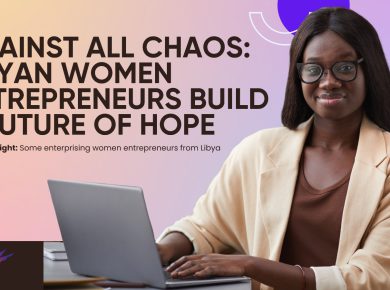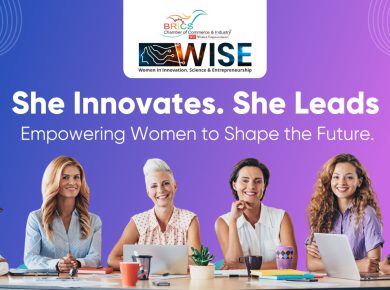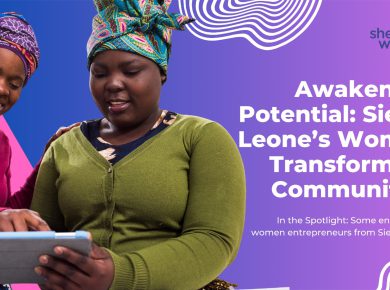In Focus: Some resources for women entrepreneurs in Libya like policies, initiatives & funding
#WomenChangemakers #LibyaBusiness #InclusiveGrowth #EmpowerHer #WomenEntrepreneurs
Known as the “Land of the Setting Sun” Libya is experiencing a significant economic and social transition. In fact, it stands at a critical juncture in its economic and social transformation, and decades of political turmoil and ongoing conflict have disrupted its social fabric – resulting in a decline in women’s social status and economic participation. But fortunately, amidst these challenges, Libyan women entrepreneurs are emerging as a powerful force for rebuilding the nation’s economy. In a country where the private sector accounts for just 5% of GDP and where entrepreneurship is largely informal, it is seen that women-led businesses hold untapped potential for growth, innovation & job creation.
Libya’s Women Entrepreneurs Shaping a New Tomorrow
Resources & initiatives are slowly and steadily shaping a more supportive ecosystem for these women. Programmes like the Libya Women Economic Empowerment (LWEE) project and the EU-funded Boost It accelerator – provide training, mentoring & funding opportunities for women-led SMEs. Global partners such as UN Women and the United Nations Economic Commission for Africa – offer capacity building, networking platforms, and advocacy to address systemic barriers such as limited access to finance, complex regulations & weak institutional support.
Despite hurdles like burdensome bureaucracy, corruption & skill mismatches between education and market needs – women entrepreneurs continue to demonstrate resilience and determination. Many lead enterprises in retail and services, but with the right tools, training, and financial support, they truly have the potential to diversify into more profitable industries and play a key role in Libya’s private-sector revival. So, by investing in women entrepreneurs, Libya is investing in inclusive economic recovery and a brighter, more sustainable future.
Now let us cast a glow on some resources like initiatives, policies and funds for women entrepreneurs in Libya.
- Libya Women Economic Empowerment (LWEE) project
This is one of the key Development Projects in Libya to aid in enhancing both women’s empowerment and the Libyan economy, the Libya Women’s Economic Empowerment (LWEE). It seeks to support women entrepreneurs & create job stability for women. Through business training, access to financing and the creation of women-owned associations, LWEE economically empowers women throughout the country – by providing them with the tools they need to succeed in the labor market and in leadership roles.
Along with increasing their political influence, Libyan women are focusing on becoming a more vocal force in the economic system of Libya. The Libya Women Economic Empowerment (LWEE) project started in October 2013, to work towards providing women roles in the economy.
Not only did they teach women how to start their business, but they held a competition among women entrepreneurs; the 20 winners received grants that enabled them to start a brand-new business or to expand an existing business. LWEE also held events where female business owners and managers were able to network with each other and establish connections that would lead to future business partnerships and support.
Here, it has been difficult for women to make a name for themselves in the business world. Since the implementation of the LWEE project, women entrepreneurs have been able to take full credit for the work they have done. This is such an important step since, in many cultures and societies, men are given credit for the accomplishments that women make.
On a positive note, women’s empowerment in Libya is on the rise and it will continue to do so for the foreseeable future.
https://borgenproject.org/womens-empowerment-in-libya/
- United Nations Economic Commission for Africa
They deliver ideas and actions for an empowered and transformed Africa; informed by the 2030 Agenda and Agenda 2063.
Established by the Economic and Social Council (ECOSOC) of the United Nations (UN) in 1958 as one of the UN’s five regional commissions – ECA’s mandate is to promote the economic and social development of its member States, foster intra-regional integration, and promote international cooperation for Africa’s development. Playing a dual role as a regional arm of the UN and as a key component of the African institutional landscape, ECA is well positioned to make unique contributions to address the Continent’s development challenges. ECA’s strength derives from its role as the only UN agency – mandated to operate at the regional and subregional levels to harness resources and bring them to bear on Africa’s priorities. ECA also provides technical advisory services – to African governments, intergovernmental organizations and institutions. In addition, it formulates and promotes development assistance programmes and acts as the executing agency for relevant operational projects.
ECA’s mission, objective and strategic directions
Their mission is – to deliver ideas and actions for an empowered and transformed Africa; informed by the 2030 Agenda and Agenda 2063. The mission is guided by ECA’s five new strategic directions which are:
(a) Advancing ECA’s position as a premier knowledge institution that builds on its unique position and privilege to bring global solutions to the continent’s problems and take local solution to the continent;
(b) Developing macroeconomic and structural policy options to accelerate economic diversification and job creation;
(c) Designing and implementing innovative financing models for infrastructure, and for human, physical and social assets for a transforming Africa;
(d) Contributing solutions to regional and transboundary challenges, with a focus on peace security and social inclusion as an important development nexus;
(e) Advocating Africa’s position at the global level and developing regional responses as a contribution to global governance issues.
https://www.linkedin.com/company/united-nations-economic-commission-for-africa
- EU4PSL project
The EU4PSL project was a European Union-funded initiative, implemented by Expertise France – focused on Private Sector Development in Libya from approximately 2018 to 2023. Its goal was – to improve the Libyan business environment to stimulate economic growth and create jobs, particularly for youth and women. Key activities included -enhancing access to finance for businesses and supporting the establishment of an SME-focused venture capital fund.
What are the details? It worked on the improvement of Libya’s business environment in order to generate economic growth and job opportunities in particular for the youth and women; and it involved government authorities, civil society organizations and entrepreneurs.
What are some key aspects of the EU4PSL project?
The Purpose is to foster economic growth and job creation by improving Libya’s business environment. The Target Audience is Libyan youth and women, and Small and Medium Enterprises (SMEs).
What are the key activities? They have –
o Worked with the Central Bank of Libya to improve access to finance for SMEs, leading to new regulations and the creation of SME support units within Libyan banks.
o Supported the establishment of a venture capital fund through Tadawul Group to provide investment for start-ups.
o Collaborated with government authorities, civil society organizations, and entrepreneurs.
o Part of broader EU support for private sector development in Libya.
And the impact? The project helped create an environment where youth and women could start their own businesses. It led to concrete actions by financial institutions to support micro, small, and medium-sized enterprises.
EU4PSL aimed at: strengthening the capacities of Libya institutions to encourage economic development; supporting civil society organizations working on youth’s and women’s economic empowerment and start-up entrepreneurship & improving access to finance for MSMEs and start-ups, including innovative financial tools and microfinance.
https://eu4skills.ly/projects/eu4psl-2018-2023/
- SLEIDSE
SLEIDSE stands for Support to Libya for Economic Integration, Diversification and Sustainable Development, a European Union-funded program implemented by Expertise France to foster a diversified private sector in Libya by supporting micro, small, and medium-sized enterprises (MSMEs), with a focus on creating employment for youth and women. The project aims – to provide training, services, and networking opportunities to entrepreneurs and Chambers of Commerce to build sustainable livelihoods and a dynamic economy in Libya.
SLEIDSE is a project funded by European Union aimed at promoting entrepreneurship and supporting the development of a diversified private sector in Libya. Using a wide range of instruments, the programme aims to disseminate entrepreneurship culture among the youth and the women. The programme also seeks to provide small businesses in Libya with local and online tailor-made development services, including a better access to finance. SLEIDSE programme is implemented in a consortium by Expertise France and GIZ.
What are the key objectives and activities?
· MSME Development: SLEIDSE supports the growth of a dynamic and diversified MSME sector across Libya, which is crucial for creating jobs and livelihoods.
· Capacity Building: The programme provides training to Libyan university professors in entrepreneurship, which then allows them to teach and mentor young entrepreneurs for free. It also aims to strengthen Libyan Chambers of Commerce by training their staff in providing tailored support services to SMEs.
· Entrepreneurial Support: The initiative organizes business plan contests, offering training on pitching business ideas to investors and connecting entrepreneurs with potential funders.
· Targeted Support for Women and Youth: A key focus of the programme is to empower women and youth by creating opportunities and providing them with the necessary skills and support to succeed in the business world.
Implementation and Funding
· Funding: The SLEIDSE program is co-funded by the European Union.
· Implementation: The project is implemented by Expertise France in partnership with other organizations, such as the GIZ, to deliver its activities on the ground in Libya.
The SLEIDSE project represents the largest international private sector development program in Libya, utilizing capacity-building operations and concrete actions to promote economic growth and diversification. It is a significant effort to integrate Libya’s private sector more effectively into the national economy and to build sustainable livelihoods for its population, particularly for women and young people.
https://www.giz.de/en/projects/private-sector-development-libya-eu4psl-sleidse-ii
- SPARK
Since 2012, SPARK was developing a culture of entrepreneurship in Libya because the economy is struggling to transition from an oil-revenue and public sector-based economy, into one that encourages private sector growth. Today, Libya is ranked at the bottom of the ‘Ease of Doing Business’ index. Despite being faced with continuous political and economic instability, SPARK provides Libyan business-owners, particularly women, with access to capital, mentorship opportunities and training programmes to stimulate job creation and economic development.
Libya’s entrepreneurs face a harsh political and economic climate. While much of the population prefers to work in the public sector, Libya’s small startup ecosystem is an untapped market that’s well equipped with internet access and strong consumer purchasing power.
The Libya Startup programme, funded by the European Union and implemented in collaboration with Super Novae – contributes to long-term business development in Libya.
In close collaboration with private sector actors, regulatory authorities, government institutions and civil society organisations, Libya Startup aims to support the emergence of a dynamic, innovative and sustainable startup ecosystem by enhancing business support structures and services dedicated to entrepreneurship and boosting the skills of young people.
https://spark.ngo/middle-east-and-north-africa/libya
https://spark.ngo/programme/libya-startup
- Jusoor
“Jusoor” in Libya primarily refers to two distinct initiatives: the Jusoor Center for Studies and Development, a non-profit think and do tank focused on women’s empowerment, economic development, and social issues; and the Jusoor Project, a training programme established in July 2025 to integrate graduates with disabilities and special needs into the labor market.
A strategic project aimed at – empowering youth with disabilities and special needs to integrate into the labor market.
Jusoor Center for Studies and Development (Jusoor) promotes research, critical thinking, open discourse and innovative solutions with a focus on women’s issues in Libya. Through its programs on small and medium enterprises (SMEs), entrepreneurship, and women’s empowerment as well as its research center and the establishment of a community of practice for diverse groups to expand networks and build partnerships.
Jusoor Center for Studies and Development is an independent non-profit organization founded in 2015 that promotes research, critical thinking, and the implementation of innovative economic and social development projects. The focus is on the fact that it specializes in women’s issues, entrepreneurship, and gender equality. The activities include – it conducts research, fosters open discourse, builds communities of practice for diverse groups, and works on gender-responsive economic development.
https://www.linkedin.com/company/jusoorly
- ACTED
Since 2011 Libyan youth have been actively interested in participating in societal affairs in ways that have never been attainable before. Libya’s youth showed an initiative in starting new and innovative projects shifting farther from public sector-oriented jobs and aiming to support themselves while simultaneously impacting their society positively. ACTED supported young Libyan entrepreneurs in managing and growing their social businesses in order to promote economic development and social entrepreneurship in Libya.
ACTED aimed to empower the Libyan youth by encouraging social entrepreneurship and supporting social entrepreneurs to develop their business through sub-grants and capacity building training. Young entrepreneurs from all over the country applied to ACTED’s programme and submitted their business plans for projects with social impact.
Six social business initiatives were selected outside of 150 applicants. The six entrepreneurs, three men and three women from Sabha, Benghazi and Tripoli, have been participating in ACTED’s coaching activities on technical managerial skills. In addition, ACTED organized a study tour in Tunis that entailed visits to co-working spaces, incubators and attendance of workshops. The main goal of this study tour was – to learn more about what social entrepreneurship means in Tunisia and better define the concept in Libya through their own work.
Six successful Libyan social businesses in focus
The six projects that participated in ACTED’s programme featured the aspects of involving technology to help other people.
Homemade – The ‘Homemade’ project aims to empower women economically by providing capacity building and business development training. Instead of working from their home, women expand their businesses and benefit from marketing techniques to expand their network.
Banat Tech – Banat Tech aims to inspire women to become contributors in technology, not just consumers by involving them in smartphone and laptop repairing. Beyond women empowerment, this also contributes to reducing the shame barrier between women and men. Banat Tech initially started as a maintenance centre, and later expanded from service to training centre. They now provide capacity building for women in the field of IT and access to new technologies, while promoting freelancing.
Palencia – Palencia, a social business in the field of medical services, provides primary health care services and medicine through home-delivered medical services targeting the eldery and disabled with affordable fees.
Al Etkan Al Momaiz – A tech team in Sabha that stated a tech space that provides trainings and tech services for and by the youth. It features programmers, technicians, training staff and web designers. They also hire legal and marketing advisors.
Al Naqaa Recycling Company – A recycling company in Sebha that collects used plastic and turns it into pellets for re-use and sells these pellets to local suppliers.
Inspire Education – Lastly, Inspire Education provides educational services in an innovative way for children and teenagers with a focus on technology and software. Their aim is for children to become more aware and educated in the fields of science and technology at a younger age.
This project proved successful as it created networking and knowledge sharing opportunities – incentivizing youth to learn the concept of social entrepreneurship, being able to define it and finally implement it in Libya. Additional support was given to the enterprises as they were trained to utilize social media – in order to market their businesses and learn skills to gain a wider following on social media platforms. This project was funded by the Foreign Commonwealth Office under the objective of promoting inclusive and sustainable growth.
https://www.acted.org/en/young-entrepreneurs-create-positive-change-in-libya/
- She WINS Africa
Through She WINS Africa, the International Finance Corporation (IFC) is helping to address the fact that women are supported in their ventures and can attract the investment they need to build upon their entrepreneurial determination and creativity.
Championing women in the private sector is central to IFC’s strategy in Africa, where IFC promotes gender equality and equal access to opportunities. IFC provides leadership training, market access, peer networks, and business management skills.
IFC, a member of the World Bank Group is the largest global development institution focused on the private sector in emerging markets.
www.linkedin.com/showcase/ifc-africa
- Women Entrepreneurs Finance Initiative (We-Fi)
We-Fi is an international partnership that supports women entrepreneurs in developing countries. Housed in the World Bank Group.
We-Fi is a collaborative partnership – among 14 governments, eight multilateral development banks (MDBs), and other public and private sector stakeholders, hosted by the World Bank Group. They seek to address financial and non-financial constraints faced by women-owned/led small and medium enterprises in developing countries.
https://www.linkedin.com/company/women-entrepreneurs-finance-initiative
- Impact Fund Programme
Grants are part of the Impact Fund Programme, an initiative led by Tatweer Research and framed within the EU funded “Strengthening Local Capacities for Resilience and Recovery” project implemented by UNDP.
The Impact Fund programme has two key objectives: one is to give financial support to some of the most promising startups and second is to start celebrating success stories of potential Libyan entrepreneurs.
With the aim of supporting the local economy recovering, UNDP partnered with Tatweer Research, which with EU funds and through Impact Fund initiative is identifying and supporting plans that will create sustainable jobs outside of the public sector.
- USAID LEAP Project Programme
As part of the USAID-funded LEAP Project, Super Novae, in collaboration with an expert on access to finance and its financial partners in Libya – has made significant progress in improving access to finance for Libyan women and young entrepreneurs. The country’s unique challenges, such as an underdeveloped entrepreneurial ecosystem and the lack of familiarity with microfinance in the Libyan banking sector, have long hindered the growth of micro and small businesses. However, through coordinated efforts, they are bringing real change to the entrepreneurial landscape.
Moreover, Super Novae is also assisting banks with key tasks such as needs assessments and risk evaluations. This dual support system ensures that both entrepreneurs and financial institutions are well-prepared to move forward. This collaboration marks a significant shift in the Libyan financial landscape, as these banks explore how to integrate microfinance into their offerings, particularly in underserved regions like southern Libya.
https://www.linkedin.com/pulse/empowering-libyan-women-young-entrepreneurs-progress-update-gpgjf
- Women in Business (WIB)
Women in Business (WIB) was started in 2013 basically to guide entrepreneurial women in Libya – to create more self-sufficient business platforms. They recognized the importance of empowering women through collaborative tools and the creation of efficient businesses that build resilient communities.
This under COMFWB who draws its mandate from
(i) the Treaty establishing the Common Market for Eastern and Southern Africa, COMESA, under Article 155 – Role of Women in Business;
(ii) Article 154- Role of Women in Development
(iii) COMFWB Charter, which mandates COMFWB to “act as a forum for the exchange of ideas and experience among women entrepreneurs; act as an instrument through which the appropriate portion of COMESA Women in Development Programmes shall be implemented; and to act as a forum for network among women entrepreneurs and an instrument for encouraging women to set up or expand existing enterprises.
Their mission is – to develop women entrepreneurship in COMESA through programmes that promote, encourage and serve the needs of women in business, working in collaboration with relevant partners
https://www.comfwb.org/member/libya










